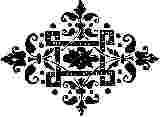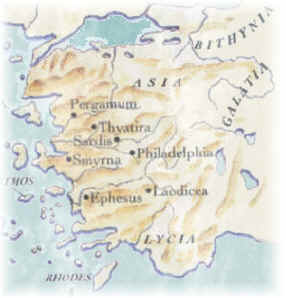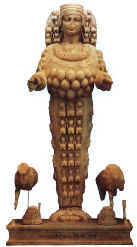
| 1 |
2 |
3 |
4 |
5 |
6 |
7 |
| Ephesus |
Smyrna |
Pergamos |
Thyatira |
Sardis |
Philadelphia |
Laodicea |
| "First,
Desirable" |
"Bitter
Affliction" |
"Earthly
Heighth" |
"Sacrifice
of Labor" |
"Prince
of Joy" |
"Love
of A Brother" |
"Just
People" |
| 33-70 AD |
70-313 |
313-1157 |
1157-1367 |
1367-1517 |
1517-1874 |
1874-? |
Paul
35-64 AD |
John
70-100 |
Arius
313-336 |
Waldo
1157-1217 |
Wycliffe
1367-1384 |
Luther
1517-1546 |
Russell
1874-1916 |
|
7 Golden
Candlesticks |
First & Last,
Dead and Alive |
Sharp 2-Edged
Sword |
Eyes like Fire,
Feet like Brass |
Livest and
Art Dead |
Key of David |
Amen,
Faithful & True
Beginning of Creation |
|
Left 1st Love |
Synagogue of
Satan |
Antipas |
Jezebel |
Come as Thief |
Hast Little
Strength |
Lukewarm |
|
Nicolaitanes |
Tribulation 10
Days |
Balaam &
Balac,
Nicolaitanes |
Depths of Satan |
Defiled Garments |
Keep from Hour of
Temptation,
Hold Fast Crown |
Gold Tried,
White Raiment Eyesalve,
Knock at Door,
Sup with Him |
| Tree of Life |
Crown of Life,
Not Hurt of 2nd Death |
Hidden Manna
White Stone, New Name |
Rod of Iron,
Potter's Vessel
Morning Star |
White Raiment,
Confess Name to Father |
Pillar in Temple,
Name of God, New Jerusalem, & New Name |
Sit in Christ's
Throne |
For more detail, click on
individual Church name.

Church of Ephesus
Revelation 2:1-7
Roughly from CE 33-70
Marking the fall of Jerusalem
Ephesus—First or Capital of the
Province
According to Thayer, Ephesus was "a maritime
city of Asia Minor, capital of Ionia and, under the Romans, of proconsular Asia, situated
on the Icarian Sea between Smyrna and Miletus."

The Seven Churches
|
The chief splendor and renown of Ephesus came from the temple of Artemis, which was
reckoned one of the wonders of the world. It is fitting that God’s true temple should
have its beginning in this first or capital city of the region with a false temple.
Hardly anyone in Ephesus knew of God’s true temple. Now, two
thousand years later, who knows of Artemis? It was burnt and rebuilt and finally
destroyed, and the world is better for that destruction. Meanwhile, the true temple is
majestically nearing completion.
It is wonderful to be on the winning side even though that does not
exempt us from being opposed and maligned. The thought of "first" derives not so
much from the Greek meaning of Ephesus as it does from the fact that it was indeed the
"first" city of the province.
|

Statue of Artemis
2nd century A.D. |
|
The "angel"
of this church was Paul. However, it is important to remember that Peter had assumed the
leading role in the Jewish church on the day of Pentecost. It was Peter who opened the
Gospel door to the Gentiles.
As the work among the Jews became overshadowed by the greater work
among the Gentiles, it fell to Paul to be the messenger.
Paul wrote the epistle to the Hebrews, endeavoring to prepare the
Jewish Christians for the demise of their nation, temple and the Jewish Law arrangement.
Hence, it was Paul who was the messenger to both Jews and Gentiles in the church.
|
Apostle Paul |
Peter and Paul covered this era,
with Paul singularly at the forefront once he began his ministry. The time frame of this
period is subject to interpretation because nothing in the text gives a clear definition
of the time covered. However, from Pentecost until the fall of Jerusalem does seem a
special period of time—the most robust and dynamic for preaching the Gospel and
establishing Christian churches in the region.
We can understand how some may mark the fall of Masada in CE 73 or how
others may view this time frame to extend to John’s closing days. However, CE 70
seems to be the time when the leadership of the church at Jerusalem was broken.
Many of the apostles had been martyred or in flight. Clearly, great
changes were precipitated here, and the status quo ended. The fall of Masada ended all
hope that somehow the past conditions of the Jewish nation could be regrouped or
recreated.
"I know thy works, and thy labor, and thy patience, and how thou
canst not bear them which are evil: and thou hast tried them which say they are apostles,
and are not, and hast found them liars;
"And hast borne, and hast patience, and for my name’s sake
hast labored, and hast not fainted." Revelation 2:2, 3
Jesus takes extravagant notice of the works
of each of the churches, and, for the most part, was much pleased with this early
church of Ephesus. The fall of the beloved city ended the Jewish Christian dominance. With
both Peter and Paul martyred, and with Jerusalem in ashes, the Gentile Christians and even
the Jewish Christians were left clinging to John as the last outpost.
In Ephesus we find
false apostles making an appearance and Nicolaitanes grasping for ascendancy. The
Nicolaitanes were allegedly followers of Nicolas, who may have been the proselyte of
Antioch, who was chosen to be one of the seven deacons to wait on tables (Acts 6:5).
He may have fulfilled the meaning of his name, which is,
"conqueror of the people." He started out as a servant of the church, but may
have become an ambitious leader with his own agenda. This always becomes a problem when
any of the Lord’s people create their own agenda.
Click to go to the following:
 For more information on history of Papacy. For more information on history of Papacy.
Topical Studies on:
7 Churches Topical Study Home Page
Ephesus - Smyrna - Pergamos - Thyatira - Sardis - Philadelphia - Laodicea
Chapter/Verse by Verse Studies on:
7 Churches Verse by Verse Home Page
Ephesus - Smyrna - Pergamos - Thyatira - Sardis - Philadelphia - Laodicea
Topical Study Home Page - Chapter Study Home Page
- Sinaitic Manuscript - Questions - Glossary.
E-Mail
Day7000@sbcglobal.net with comments.
Copyright 2001 John Class
|